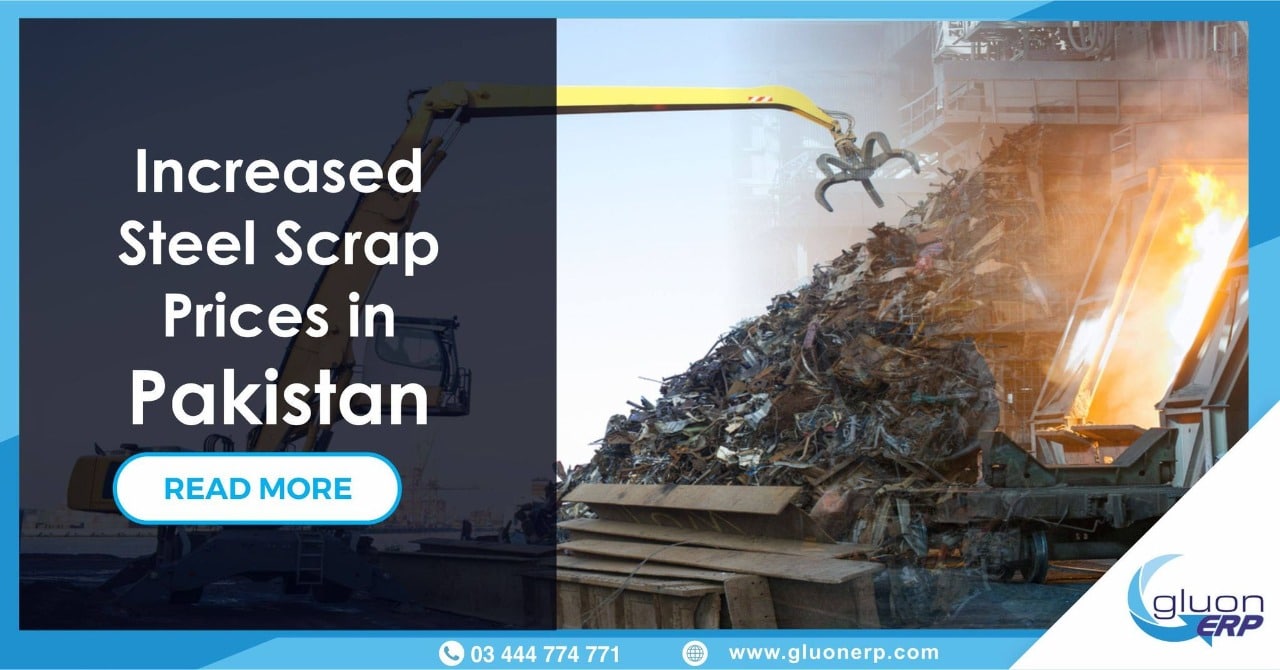
Compliance is important for businesses to operate within the scrap steel industry. The industry continually faces a problem with steel scrap prices in Pakistan. This data must be correctly registered and preserved so that businesses can easily satisfy the criteria for compliance in the future. The unified solution of the ERP system simplifies the managing process of this material. To maximize operating efficiency and securely maintain compliance, Gluon ERP offers hardware modules to manage container shortage.
Rising freight charges are hand-in-hand with manufactured price pressure to take local market iron and steel scrap prices up 100% after the Covid-19 coronavirus-related lockdown earlier this year.
Doubling Price Pressure
At Port Qasim, the iron and steel scrap price on arrival are twice as much (from $250/ton in April to $500/ton) for booking in December. Freight charges have also doubled due to container unavailability, which is a factor in rising scrap costs and freight prices. Local steelmakers have jacked up their commodity prices by Rs7, 000/ton in response to the scrap price pressure.
The world economy is staggering due to coronavirus. In the US, for the first time since 2008, hot-rolled coil prices have reached the $1,000 mark. Besides, US rebar prices have hit a peak of more than eight years to cross $740. Therefore, where the prices have increased in the US, it was obvious that the prices of steel will also increase in Pakistan given how our industry functions according to the dollar rate.
Domestic steel prices are increasing due to different externalities such as supply shocks associated with the raw material feed and extreme disruptions in steel scrap collection due to intermittent virus lockdowns coupled with seasonal steel scrap shortages associated with winters.
Pakistan’s global steel industry has invested in recent years to meet a production potential of 5 million tons that is still under-utilized. The imported rebar cost from Turkey is currently $700 CNF, which would amount to Rs200, 000/ton inclusive of duties and taxes. Locally made reinforcing steel, referred to as “rebars,” trades at a 30-35 percent discount due to intense domestic supply.
Challenges
Pakistan steel association forced the government to end all raw material duties to mitigate the effect of a dramatic rise in the prices of material used, which is over $400 per ton. For many years now the steel industry, facing major cost increases.
Since January 2018, there were major effects on the cost of raw materials and electricity for the steel industry. Electricity prices have increased by 56pc since 2018 and gas costs have increased by 116pc. Interest rates doubled from 7pc to 12pc between January 2018 and early 2020. Finally, the lockdowns of Covid-19 inflated the losses suffered by the industry and resulted in a substantial rise in trade, contributing to higher borrowing and financial costs.
Some container shipping lines refuse to pay prices for steel scrap metal shipments to South Asia in December and even cancel certain existing orders.
Although facing major challenges, business leaders invested Billions in the introduction of the new European technology to reduce energy consumption and improve the quality of their products. With the assistance of ERP software, many players have increased their ability to benefit from economies of scale and respond to local demand.
The steel bar industry is highly competitive, with over 300 companies producing steel bars. Cost reductions convert very easily into lower local market prices. The steel sector reported industries are operating at low margins to provide the construction region with cost-effective steel bars.
Bulk Shipment
An increasingly viable alternative has turned to bulk shipments of scrap material, which subsequently sell to multiple buyers. While one Pakistani trader already found “doable” bulk shipments. Rumors were that one European recycling company was making sales in containers or bulk against the option of shipping scrap.
Finally, the increased prices have somehow affected the steel scrap market in Pakistan. In addition to logistical problems related to container shortages and rising freight prices, the ongoing shortage of available products has also led to price firmness.




Comments